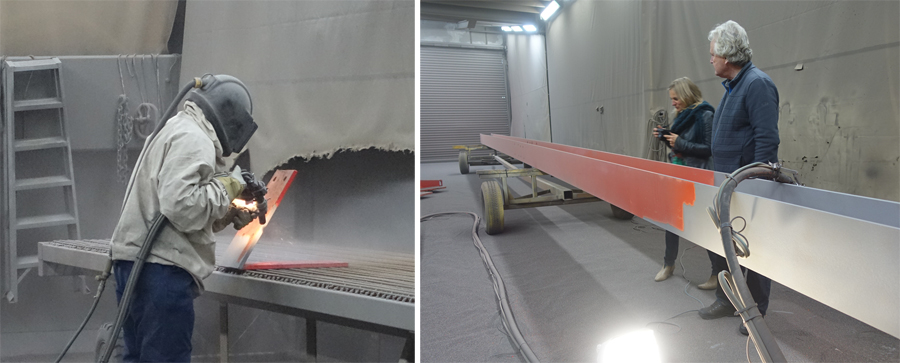K-piece at the paint-shop: sandblasting
The old paint layer of K-piece is removed using a sandblasting technique in a sealed room at the paint-shop. In this technique, tiny grains of grit are blown against the surface with great force. The abrasive effect removes the paint layer. The old paint layers were, however, retained in two places. Thus it remains possible in future to trace the treatment history of the past 44 years. After the old paint layers are removed, a new coat can be applied. The paint used is a car paint, composed of 6 different layers. This composition provides good protection of the metal surface against corrosion. For a nice even result, the paint is guned onto the surface with a spray gun.
After the old paint layers are removed, a new coat can be applied. The paint used is a car paint, composed of 6 different layers. This composition provides good protection of the metal surface against corrosion. For a nice even result, the paint is guned onto the surface with a spray gun.
Picking up the pieces
The freshly painted elements of K-piece are collected early in the morning on 16 November. The separate sections are loaded onto a lorry with a forklift truck. Very carefully, as the new paint layer must absolutely not be damaged. During transportation, pieces of carpet are used to protect the sections against bumps.
The reconstruction of K-piece
Upon arriving at the museum, all the separate parts of K-piece are laid on the grass like puzzle pieces. The surface is thoroughly cleaned once again. Subsequently, the parts are reassembled with a crane and bolted together. When all the parts are secured, the letter K is formed again and the work as a whole can be hoisted upright with the crane.

The last remaining task is to retouch the nearly 100 bolts. The result: a piece of K! 

Nikki van Basten
Conservator of modern and contemporary art
Susanne Kensche
Conservator of modern art and sculpture at the Kröller-Müller Museum
April 2016
Acknowledgements
Many people helped us to carry out the research and the treatment. Thus, we wish to thank the following individuals and organizations:
Mark di Suvero, Ivana Mestrovic, Kent Johnson (Spacetime CC)
Lydia Beerkens (Senior Conservator of Modern Art)
Herman Boterenbrood, Mark Bouma and staff (Spuiterij Boterenbrood paint-shop)
Guido and Michel Slegers (De Slegers metal works)
Jan Udema, Helen Veringmeier, John van der Werff (AkzoNobel)
Rachel Rivenc, Julia Langenbacher (Getty Conservation Institute)
Julie Wolfe (J. Paul Getty Museum)
University of Amsterdam
